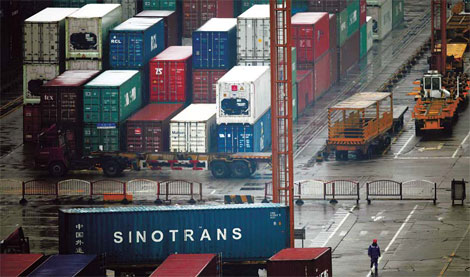Economy
Nation 'unlikely' to reduce export rebates
Updated: 2011-01-25 09:04
By Ding Qingfen (China Daily)
|
 |
|
A worker walks amongst shipping containers at the port of Shanghai. The Ministry of Commerce said there is no immediate plan to launch more tax rebate policies, commenting on a report that several ministries are mulling cutting export rebates on certain products. [Photo/Reuters] |
Official from MOFCOM said cuts won't be considered in 1st half of 2011
BEIJING - China expects to maintain the stability of its export-related policy, and it is "highly unlikely" that the country will reduce export rebates for highly polluting and energy-intensive industries "during the first half", said a senior Ministry of Commerce (MOFCOM) official.
The Economic Information newspaper reported on Monday that some Chinese ministries are mulling reducing and canceling export-tax rebates on selected products which are highly polluting and energy-intensive, but a senior official from the MOFCOM, in charge of drafting export-related policies, told China Daily that such a decision will not come any time soon.
"We will not take any sort of measures in the first quarter, or even the first half of the year, if there are no signs of an entrenched recovery in the global economy," he added.
Citing an unnamed source, the Economic Information said new tax-rebate measures will probably cover several categories including rubber, steel and materials for construction, although the rate of any rebate was not disclosed. The newspaper said the ministries have finished preliminary research work, but did not outline when the authorities would launch concrete proposals.
"Deciding on a timetable is fairly complicated, as many factors, such as the trend of China's exports, have to be taken into consideration," the report said.
Last June, China announced it would scrap tax rebates on some 406 categories of exported products, especially in polluting and energy-intensive industries, a move which signalled a shift in the country's economic development pattern in favor of "green" growth.
As part of its 12th Five-Year Plan (2011-2015), the State Council said China will strengthen efforts to become a more environmentally friendly and energy- and resource-saving economy.
But as external demand is still fragile and many uncertainties exist, including the rising costs of labor and raw materials and possible yuan appreciation, "the stability of export and relevant policies is the most important of all", said Long Guoqiang, a senior trade expert at the Development Research Center of the State Council. "There will be more advantages than disadvantages if we can maintain it (policy stability)."
Song Hong, a senior researcher on international trade from the Chinese Academy of Social Sciences, said: "A reduction in tax rebates would restrict production and exports of environmentally-polluting and energy-intensive goods. China must implement change in a steady but stable manner since any small move will have a fairly big impact on the profitability of the industries involved."
China's foreign trade reached a record high of $2.9 trillion in 2010, up 34.7 percent year-on-year, and exports grew by 31.3 percent year-on-year to $1.58 trillion. Experts have predicted that export growth will slow to 15 or 20 percent this year.
Chen Deming, the minister of commerce, also said at the annual commerce conference in December that China's exports will be challenged by the European debt crisis, currency revaluation expectations and the rising price of commodities this year.
"China will try to stabilize exports and strike more balanced trade," said Chen.
China's monthly trade surplus has remained high, at around $20 billion, since the second half of 2010. That has provided some foreign nations, including the United States, with ammunition to pressure China to allow its currency to rise, despite the country's moves to narrow its surplus gradually this year as more measures to promote imports are underway.
Adjustments - whether a rebate increase or reduction - will be implemented if the trade situation changes, said the MOFCOM official.
"If the trade surplus is large enough and stable global economic growth is maintained, China will make the appropriate adjustments to the tax-rebate policies," he said.
E-paper

Ear We Go
China and the world set to embrace the merciful, peaceful year of rabbit
Preview of the coming issue
Carrefour finds the going tough in China
Maid to Order
Specials

Mysteries written in blood
Historical records and Caucasian features of locals suggest link with Roman Empire.

Winning Charm
Coastal Yantai banks on little things that matter to grow

New rules to hit property market
The State Council launched a new round of measures to rein in property prices.




